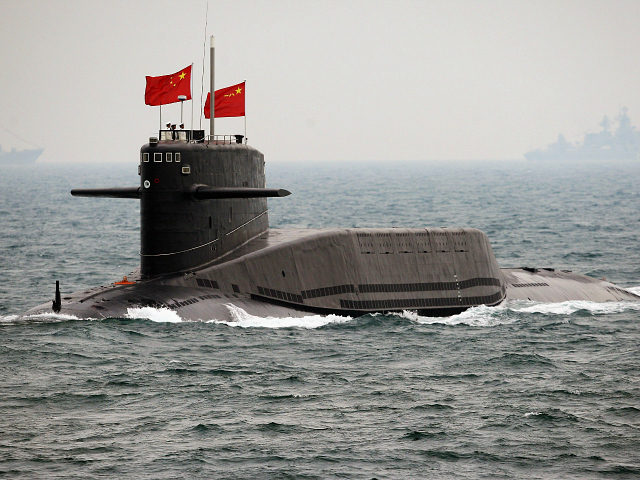China is considering modifications to its maritime law that would require foreign vessels to identify themselves to Beijing and would require submarines to travel above the surface. As China considers most of the South China Sea and some of the East China Sea as its own, the law would thus require Vietnamese, Philippine, and other vessels to report to China in their own domestic waters.
The Chinese government announced the potential modifications last week, requesting “public opinion” on the matter. The legislation would be an expansion of the 1984 Maritime Traffic Safety Law and not only demand identification from “foreign” vessels, but give China the ability to block any vessels it chooses from trafficking through these waters. Chinese officials claim the law would abide by the “the UN Convention on the Law of the Sea and Chinese laws on the sea, adjacent areas and exclusive economic zones.”
“Foreign submersibles should travel on the surface, display national flags and report to Chinese maritime management administrations when they pass China’s water areas… they should also get approval from the relevant administration to enter China’s internal waters and ports,” Chinese state-run media reported.
As Defense One notes, however, the law would not be limited to Chinese waters because the Chinese government’s maritime claims openly defy international law. “China claims nearly all of the contested South China Sea—with its strategic shipping lanes, rich fishing grounds, and oil and gas deposits—as its own territory,” the outlet notes. The waters in question overlap with the sovereign territory of the Philippines, Malaysia, Brunei, Vietnam, Taiwan, and the waters off Natuna Island, Indonesia.
China has invested millions in installing military facilities and weaponry in the Spratly and Paracel Islands and has begun construction of artificial islands in the Scarborough Shoal, all territories of Vietnam and the Philippines. Should the law pass, Philippine ships in the Spratly Islands, for example, would have to tell Chinese officials when they pass through their own domestic waters. If they choose not to, they may face up to a $70,000 fine.
The Chinese government appears to see this as an intended effect of the law. The state-run propaganda newspaper the Global Times cited a “maritime border expert” this week noting the law would do exactly what its international critics fear: give China a stranglehold on waters it does not control legally in the South China Sea. “As a sovereign State and the biggest coastal State in, for example, the South China Sea, China is entitled to adjust its maritime laws as needed, which will also promote peace and stable development in the waters,” the expert, Wang Xiaopeng, said.
In a press conference Tuesday, Foreign Ministry spokesman Geng Shuang reiterated the Chinese claim to all the South China Sea, in response to the Trump administration’s assertions that the United States would not allow China to colonize the region: “China has indisputable sovereignty over Nanhai Zhudao [the South China Sea islands] and the adjacent waters. China firmly safeguards its territorial sovereignty and maritime rights and interests.”
The United States deployed the USS Carl Vinson, a Nimitz-class aircraft carrier, to the international waters of the South China Sea this week to practice “freedom of navigation” exercises, intended to keep China from claiming the international waters for itself. The U.S. Navy described the operations as “routine.”
Under the proposed Chinese law, the USS Carl Vinson would require Chinese permission for such a voyage.
The Global Times has condemned the Vinson voyage as an attempt to agitate the nations whose sovereignty China is disregarding and called Washington’s objection to Chinese claims in the region “unfounded” despite an international legal tribunal rejecting the claims in July 2016.

COMMENTS
Please let us know if you're having issues with commenting.